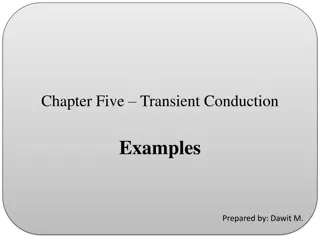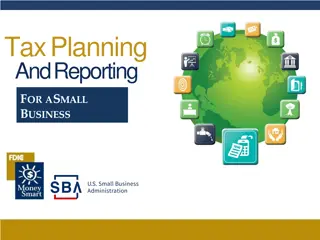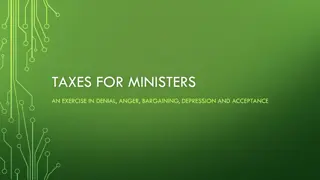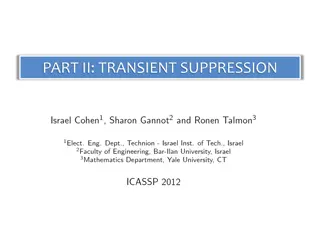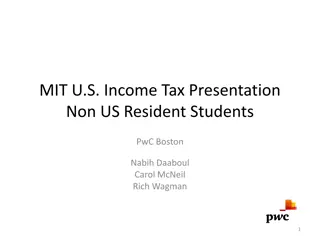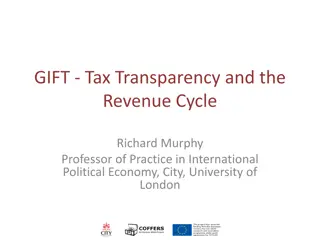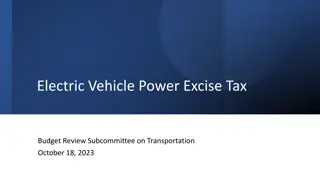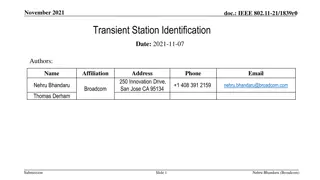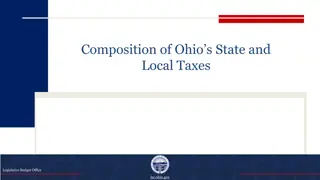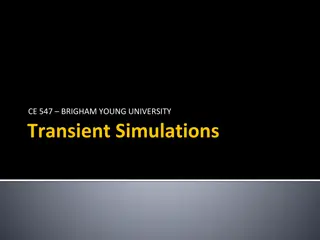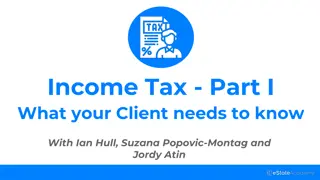State and Local Transient Room Tax Reporting System Considerations
The Kentucky Department of Revenue discussed the costs and benefits of integrating the local transient room tax reporting and distribution system. The study also looked into the experiences of border states like Virginia and Indiana with similar tax structures. While no fully integrated system was found, different approaches were observed, including centralized collection and reporting for lodging taxes in some jurisdictions.
Download Presentation

Please find below an Image/Link to download the presentation.
The content on the website is provided AS IS for your information and personal use only. It may not be sold, licensed, or shared on other websites without obtaining consent from the author.If you encounter any issues during the download, it is possible that the publisher has removed the file from their server.
You are allowed to download the files provided on this website for personal or commercial use, subject to the condition that they are used lawfully. All files are the property of their respective owners.
The content on the website is provided AS IS for your information and personal use only. It may not be sold, licensed, or shared on other websites without obtaining consent from the author.
E N D
Presentation Transcript
Integrated Integrated State and Local State and Local Transient Room Tax Transient Room Tax Reporting and Reporting and Distribution System Distribution System Considerations Considerations Kentucky Department of Revenue Interim Joint A&R Committee, November 2, 2023
Costs and Benefits Considered Under current law (HB 8), online facilitators must collect and file returns on their total rental receipts. There are no legal or technological barriers preventing businesses from meeting these requirements. Shifting administration of the local transient room tax to the Department of Revenue (DOR) would require significant investments in: Time- At least 12 months of programming and deployment after the Department of Revenue s Integrated Tax System (DORIS) schedule for subsequent releases can be reconfigured to include the local transient room tax collection and distribution functionality. Release 1 is anticipated in the second half of 2024. Release 2 scope primarily involves income taxes. Expense- At least $2.4 million for initial programming development and $366K in annual personnel costs. Ongoing maintenance will also add to the total. Personnel- A minimum of 4 additional staff positions needed.
Border State Experiences The study examined border states with similar local transient room taxes and greater consolidation capacity within their tax structure. Although considered, none of these states has developed a fully integrated reporting and distribution system for lodging taxes. Virginia Has a fully integrated system for state and local sales and use taxes with 133 city and county jurisdictions and four separate regional tax rates. VA local governments have their own infrastructure for administering various local taxes, including transient room taxes. In an October 2022 study, the VA work group did not recommend moving forward with development of a centralized electronic portal for state administration of local transient room taxes. In 2021, VA enacted legislation requiring collection of local transient tax on online facilitators fees charged as part of room rental transactions.
Border State Experiences cont. Indiana- Although it does not have a local option sales tax, IN has a long history of administering local taxes for various local jurisdictions (local income taxes, food and beverage taxes, and the innkeeper s tax). The state has 80 county-wide jurisdictions for the innkeeper s tax with counties given the option to self administer or elect state administration. Most counties choose to administer their own lodging taxes. The Department of Revenue currently collects for only 15 counties. The IN Department of Revenue has always had the capacity to calculate local tourism tax rates across all counties and to accept returns and payments from any jurisdiction if requested, but there is no mandate. In 2019, IN enacted Marketplace Provider legislation that requires short-term vacation rental and other online platforms to register with the state for centralized collection and reporting of the local innkeeper s tax across all 80 counties. This provision is a limited integration for only certain business classifications.
Border State Experiences cont. Tennessee TN is well-known for a tax structure that relies heavily upon sales taxes rather than income taxes. It has a longstanding local option sales tax centrally administered by the state for multiple local jurisdictions across all 95 counties. In July 2020, TN enacted legislation requiring online travel companies to centrally report their receipts from all short-term rentals of residential units to the state. The provision was relatively easy for the TN Department of Revenue to implement by adding a new filing schedule within its centralized sales and use tax system to facilitate the January 1, 2022, effective date. TN has approximately 20 unique taxpayers filing under the new requirements, but it has chosen not to expand the integrated filing requirement to all accommodation providers liable for local transient room taxes.
Local Kentucky Jurisdiction Stakeholders Local ordinances establishing a local transient tax have been in place for decades. The impacted local governments have committed personnel and, in many cases, have made infrastructure investments to handle the required reporting and payment provisions. Below are excerpts from the KY League of Cities and the Louisville Metro Revenue Commission that submitted letters for inclusion in the DOR study (Appendix B). KY League of Cities (KLC) KLC remains steadfastly opposed to the state collection of local revenue. It has been the long-standing position of city governments and KLC to oppose any attempted breach of local autonomy in the administration of local taxes and fees. There are no special circumstances or other compelling policy reasons applicable to transient room taxes that would warrant a reversal of our position or consideration by the state of attempting to pass legislation that would infringe on home rule and local responsibility regarding the administration of this tax. This is especially true in light of the General Assembly s passage of HB 8 in the 2022 Regular Session requiring online reservation platforms to collect and remit the tax in the same manner as establishments located within the boundaries of the local taxing jurisdiction.
Local Kentucky Jurisdiction Stakeholders cont. Louisville Metro Revenue Commission (LMRC) Today, the Revenue Commission levies an 8.5% transient tax in aggregate. The collective 8.5% represents five separate enactments for different entities and purposes. HB 8 expanded that [collection] responsibility to online travel companies such as AirBnB, VRBO, and Evolve. As the Revenue Commission had already been collecting the transient tax from certain online travel companies, it was able to quickly pivot in response to the legislative change and began expanding this offering to ALL online travel companies effective July 1, 2023. As recently as 2022, Louisville Metro Council enacted legislation creating the Greater Louisville Lodging Management District to collect an assessment on certain hotels to improve tourism in Louisville Metro . We are in the beginning process of implementing that assessment to offer a seamless, one stop location for the lodging industry to file both the transient tax return and pay their annual assessments where applicable. Software upgrades are already underway to facilitate this process. It is the position of LMRC that conversion to a centralized system is unnecessary for Louisville Metro and could actually impede the collection and distribution of these revenues in a timely, accurate manner.
Study Recommendations The Department of Revenue does not recommend adding local transient room taxes to its administrative duties at the present time or the foreseeable future. HB 8 provisions requiring short-term vacation rental platforms to report and remit local transient room taxes on their receipts for facilitating the rental of accommodations in this state should be allowed to take effect and be enforced. Currently, there are at least 108 local tourism districts across the state with a local transient room tax imposition. HB 8 equalized the tax base for state and local transient room taxes. In collaboration with local jurisdictions, other administrative simplifications should be considered to create uniform rules for filing frequencies, due dates, and return formatting where possible. The integration of local transient room taxes in Kentucky for any category of taxpayers imposes the same logistical and system costs upon DOR as full integration for all business models.
CONTACT INFORMATION Department of Revenue: https://revenue.ky.gov/Business/Transient-Room-Tax/Pages/default.aspx Tax Answers: https://taxanswers.ky.gov/Sales-and-Excise-Taxes/Pages/Transient-Room-Tax.aspx Excise Tax Section Email: dor.webresponseexcisetax@ky.gov Excise Tax Section Phone Number: 502-564-3853 Office of Sales & Excise Taxes Executive Director: Richard Dobson Richard.Dobson@ky.gov 502-564-5523 Division of Miscellaneous Taxes Director: Kim Hensley KimberlyF.Hensley@ky.gov 502-782-1644 Assistant Director: Toni Fields Latonia.Fields@ky.gov 502-564-2087
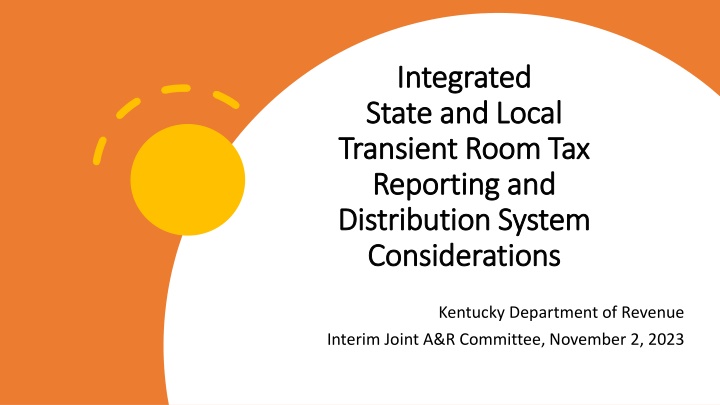


![Town of [Town Name] Real Estate Tax Rates and FY 2024 Budget Summary](/thumb/62211/town-of-town-name-real-estate-tax-rates-and-fy-2024-budget-summary.jpg)


